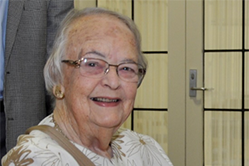Vale Dr Margaret Middleton—a pillar of science and the Academy
- 3 mins read


Dr Margaret Middleton on a visit to the Academy in 2014.
10 April 1928 – 2 March 2019
Dr Margaret Middleton, a committed supporter of young researchers, has died aged at the age of 90.
Dr Middleton had a long and distinguished relationship with the Academy. She became a patron of the Foundation for Science in 1992 and had an active scientific mind throughout her life—not only as an observer on the award in her name but also participating in and leading discussions responding to Colin Butler’s 2003 report on Population and Environment in Australia, joining forces on that occasion with another Academy award patron, Dr William H Gladstones.
In 1997, in consultation with Dr Middleton, plans were laid to establish the the Margaret Middleton Fund for endangered Australian native vertebrate animals. The fund offers annual science grants of up to $15,000 each to support field-based, high-quality ecological research. The objective of the grant is to provide financial support for conservation-based research of Australian ecosystems that ultimately will lead to tangible outcomes for management.
Dr Middleton worked closely with the award selection committee over the following years and read every detail in the applications. Her generous and longstanding contributions have funded 82 research projects since 2000, many of which would most likely not otherwise have been undertaken.
Research projects have ranged from investigations into vaccines against chlamydia infection in koalas, to studies confirming selective plastic ingestion by sea turtles and the disproportional ingestion of balloons, which supported the hypothesis that they ingest debris that resemble natural prey items such as jellyfish.
In 2019 the Academy awarded the Margaret Middleton Award to:
- Ms Rebecca Jane Webb, James Cook University: A novel conservation tool for controlling chytridiomycosis in Australian amphibians.
- Dr Teigan Cremona, Charles Darwin University: Can predator enclosures support recovery of small mammal populations in Kakadu National Park?
- Ms Heather Neilly, Australian Landscape Trust: Malleefowl as ecosystem engineers and drivers of restoration.
Margaret Middleton surrounded herself with an eclectic group of friends. Each and every one could tell stories about their time with Margaret and the keen mind that delighted and challenged the unwary.
The following is a memory of Margaret that I shall never forget. We were sitting in her lounge room one afternoon and got into a discussion of my involvement assisting to organise an International Wildlife Disease meeting held in Maroochydore in July 2015. I was telling her about our traditional silent auction to raise funds to support students. When she learned that my home-made crab apple and quince jellies went for $200/ jar at the auction she asked whether I had any left and if so, she’d like to try some, and support students doing wildlife disease studies. I said I’d bring a jar of each on my next visit. With that she walked into her study, came out with a cheque book and wrote a cheque to the WDA Australasian Section for $5000!! Needless to say, I was stunned! That was Margaret, a most generous individual offering support to students and their wildlife studies.Dr David Spratt at CSIRO
Margaret was a dedicated supporter of science at the Academy and a shrewd investor in its outcomes. We shall miss her wise counsel, and remember her great generosity with gratitude.Professor Andrew Holmes • Immediate past President at Australian Academy of Science
Published 11 March 2019





